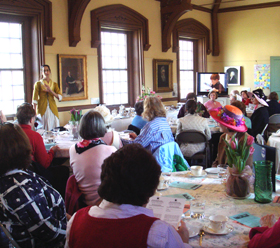Philipse Manor Hall State Historic Site

29 Warburton Avenue
Yonkers, NY 10701
- General Information: (914) 965-4027

Don't miss these popular destinations and attractions within or near the historic site
- Beczak Environmental Education Center-exhibits and programs both indoors, outdoors and in the Hudson River! Maintained by Sarah Lawrence College
- Philipse Manor Hall Community Gallery-located in the Gothic Chamber, this space features temporary exhibits from local artists and community groups.
- Science Barge-The Science Barge is a prototype sustainable urban farm developed by NY Sun Works and operates as an environmental education center. The barge is maintained by Groundwork Hudson Valley.
- Untermyer Gardens Conservancy- Located a few miles north of the Manor, the Conservancy collaborates with the City of Yonkers to facilitate the restoration and promotion of Samuel Untermyer's property and gardens for the general public. Open daily until sunset, free of charge.
- Philipsburg Manor-another site of Frederick Philipse, this restored Dutch Colonial manor house and grounds features farm animals and a water-powered mill. Maintained by Historic Hudson Valley
- Sunnyside-19th century romantic landscape estate of Washington Irving (author of Rip Van Winkle, among other others). Maintained by Historic Hudson Valley.
- John Jay Homestead State Historic Site-located 20 miles north of the Manor Hall, the Homestead is the retirement home of local Founding Father and Philipse relative, John Jay. Situated on 52 acres of the original property, the grounds are open daily with scheduled guided tours of the house on most days.
- Rockefeller State Park Preserve-located 15 miles north, idealized carriage trails created by John D. Rockefeller, Jr. Access to 55 miles of meandering trails with streams, pastures, ridges, a 22-acre lake and the Hudson River.
- Old Croton Aqueduct State Historic Park- Opened in 1842 to bring fresh water to NYC, in 1968 the New York State Office of Parks, Recreation and Historic Preservation purchased 26.2 miles of the original 41 mile aqueduct which is now a hiking, biking and walking trail that passes a few blocks away from Philipse Manor Hall.
Hours of Operation
Monday – Closed
Tuesday – Closed
Wednesday – 10 am to 5 pm
Thursday – 10 am to 5 pm
Friday – 10 am to 5 pm
Saturday – 10 am to 5 pm
Sunday – 10 am to 5 pm
The site may be closed for holidays or open additional hours for special programs. Visit www.philipsemanorhall.com/programs-and-events for details.
Fees & Rates
- Admission
- Adults - $6Seniors (62+)/Student (with ID) - $3Children under 12 - freeFor information on group rates, special tours, field trips, and more, visit www.philipsemanorhall.com/educationFor information on special community gallery exhibits and other public events, visit www.philipsemanorhall.com/programs-and-events
- Educational Programs
- $1-3/student on-site, depending on the program
$50/presentation/hr off-site - Special Events
- Vary according to the program. Call site for details.
Philipse Manor Hall welcomes students and adults from a wide variety of educational organizations for special programs and private tours! Program options include field trips, walking tours, in-class programs, lectures, and more. Visit www.philipsemanorhall.com/education for details and how to register.
Self-guided tours of Philipse Manor Hall's interactive exhibits may be taken any time during museum hours. Museum interpreters are available daily to answer questions.
Wednesday, July 16, 2025 12:00 PM - 02:00 PM
Philipse Manor Hall State Historic Site
Saturday, July 26, 2025 10:30 AM - 12:00 PM
Philipse Manor Hall State Historic Site
Wednesday, August 6, 2025 12:00 PM - 02:00 PM
Philipse Manor Hall State Historic Site
Saturday, August 9, 2025 10:30 AM - 12:00 PM
Philipse Manor Hall State Historic Site
Saturday, August 16, 2025 10:00 AM - 11:00 AM
Philipse Manor Hall State Historic Site
Amenities Information
- Amenities
- Picnic Area
- Tours
